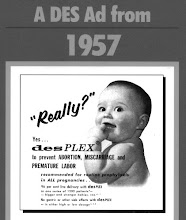
Looking for a bit of news on the side about DES?
Go to TWITTER @DESAustraliaNSW
Personal and consumer aspects of DES exposure in Australia
 The Consumers Health Forum of Australia's October issue of Health Voices has an article about DES on page 10 & 11. The article When medicines harm: the DES experience and how we can avoid it happening again gives a chilling account of the DES story, the lessons from the tragedy and the Australian response in the aftermath.
The Consumers Health Forum of Australia's October issue of Health Voices has an article about DES on page 10 & 11. The article When medicines harm: the DES experience and how we can avoid it happening again gives a chilling account of the DES story, the lessons from the tragedy and the Australian response in the aftermath. On You Tube US researcher, Dr Arthur Herbst provides a most interesting account of the finding of the DES link to cancer. This footage commemorates Arthur L. Herbst and the 40th anniversary of his landmark DES paper. Your doctor might also be interested in this. Here is the link:
On You Tube US researcher, Dr Arthur Herbst provides a most interesting account of the finding of the DES link to cancer. This footage commemorates Arthur L. Herbst and the 40th anniversary of his landmark DES paper. Your doctor might also be interested in this. Here is the link: In the October 6 New England Journal of Medicine (NEJM) US Epidemiologist, Dr Robert Hoover and his colleagues estimated the absolute risks of 12 health outcomes associated with prenatal exposure to DES, including certain cancers and reproductive problems such as infertility, ectopic pregnancies and preterm births.
In the October 6 New England Journal of Medicine (NEJM) US Epidemiologist, Dr Robert Hoover and his colleagues estimated the absolute risks of 12 health outcomes associated with prenatal exposure to DES, including certain cancers and reproductive problems such as infertility, ectopic pregnancies and preterm births. WONDER DRUG screenwriter Caitlin McCarthy has been nominated for the 2011 Presidential Citizens Medal (www.whitehouse.gov/citizensmedal). Due to Caitlin's efforts and work with the offices of Senators Kerry and Brown, the FDA finally acknowledged DES as a "tragedy" in 2011 after 40 years. Caitlin also champions DES awareness through her screenwriting, blogging, activism, public speaking, and government/media relations.
WONDER DRUG screenwriter Caitlin McCarthy has been nominated for the 2011 Presidential Citizens Medal (www.whitehouse.gov/citizensmedal). Due to Caitlin's efforts and work with the offices of Senators Kerry and Brown, the FDA finally acknowledged DES as a "tragedy" in 2011 after 40 years. Caitlin also champions DES awareness through her screenwriting, blogging, activism, public speaking, and government/media relations. Up to 185,000 Australian women have increased risk of cancer, infertility, stillbirth and early menopause
Up to 185,000 Australian women have increased risk of cancer, infertility, stillbirth and early menopause Caitlin McCarthy has written about her DES experience for the US Readers'Digest Life Story competition. Her winning will mean showcasing the DES cause world-wide. You can help by voting for Caitlin's story EVERY DAY until November 15th at
Caitlin McCarthy has written about her DES experience for the US Readers'Digest Life Story competition. Her winning will mean showcasing the DES cause world-wide. You can help by voting for Caitlin's story EVERY DAY until November 15th at 53 DES daughter breast cancer cases are now before US District Court for the District of Massachusetts, Boston, for a ruling on the scientific validity of evidence implicating DES with breast cancer in DES daughters after age 40.
53 DES daughter breast cancer cases are now before US District Court for the District of Massachusetts, Boston, for a ruling on the scientific validity of evidence implicating DES with breast cancer in DES daughters after age 40. Media Alert
Media Alert
The website has a listing of DES knowledgeable health care providers in Australia. Information and support is available by phoning DES Action Australia-NSW 02 98754820.
for support and resources.
P: (02) 98754820
 The DES Awareness Week event provides an instant angle on the DES story for journalists and the public attention generated helps DES exposed people who otherwise would not have known about the harm of DES and the special health care they need. For the past six years DES Action Australia-NSW has held DES Awareness Week June 1-7 on government health event calendars. These events have successfully raised awareness of DES Australia-wide and helped many DES exposed people. We know the effect of the DES Action group's unfunded events would be no match success-wise to the promotion of DES information in government public health programs. However, until such time that government action occurs, the opportunity that DES Awareness Week provides should be taken. Here is a recent article:
The DES Awareness Week event provides an instant angle on the DES story for journalists and the public attention generated helps DES exposed people who otherwise would not have known about the harm of DES and the special health care they need. For the past six years DES Action Australia-NSW has held DES Awareness Week June 1-7 on government health event calendars. These events have successfully raised awareness of DES Australia-wide and helped many DES exposed people. We know the effect of the DES Action group's unfunded events would be no match success-wise to the promotion of DES information in government public health programs. However, until such time that government action occurs, the opportunity that DES Awareness Week provides should be taken. Here is a recent article:http://www.theherald.com.au/news/local/news/general/hunter-cancer-time-bomb/2193686.asp
By the way, we always need help from Australian volunteers in sharing their DES stories for journalists. If you can help, please phone 02 98754820.
We have great news too that DES Awareness Week is happening now in Massachusetts USA for July 17-23. Here is US article:
http://www.telegram.com/apps/pbcs.dll/article?AID=%2F20110720%2FNEWS%2F107209927